

Meeting agendas are the foundation of productive, well-organized gatherings. Whether you're running a team meeting, problem-solving session or innovation workshop, a well-structured meeting agenda template can make the difference between a successful session and one that wastes everyone's time.
In this blog post, we'll explore ten meeting agenda examples that cater to various meeting types and objectives. By the end of this article, you'll have a toolbox of ideas and agendas to help you plan and facilitate more effective and efficient meetings.
Join the 150,000+ facilitators using SessionLab.
The process of planning and organizing meetings can bring up challenging questions. What are the best practices for meeting design? What agenda items should you include? How do you ensure your meeting stays on time while also covering everything your team needs to be productive and aligned?
Whether you’re a seasoned manager or new to running meetings, exploring some example meeting agendas and learning from others is a great way to save time and improve your meeting practice. Keep reading to explore 10 effective meeting agenda templates you can start using in your next session.
You’ll find a Word agenda template for each session, alongside a SessionLab meeting agenda templates you can use to take your agenda design to the next level.
Before we dive into specific agenda examples, let’s discuss what elements you should include in a meeting agenda template, regardless of the meeting type. A well-rounded agenda typically contains the following components:
Every example meeting agenda below contains everything you need to run the session. You’ll find instructions, a meeting objective, time allocation and other items you need to get started. We’ve also included tips and details that can help ensure your meeting will be success.
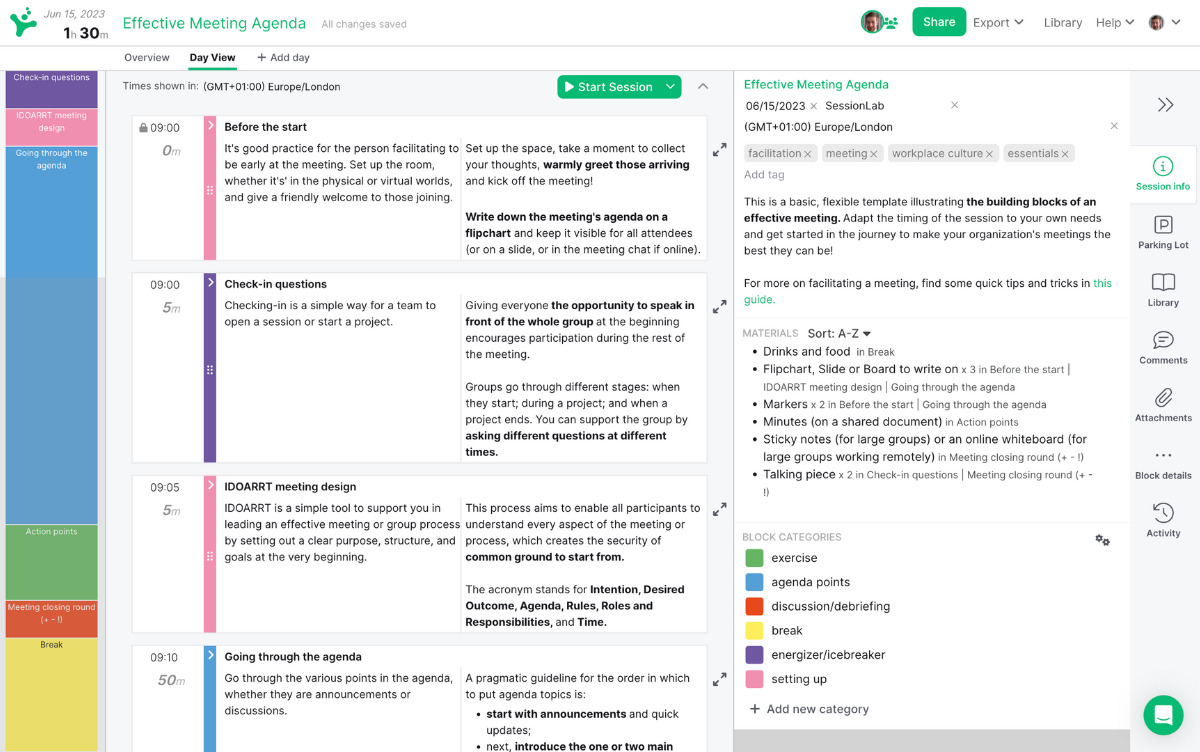
Of course, you’ll want to add your own content and customize your agenda to your needs. In SessionLab, it’s easy to drag, drop and reorder blocks to create a perfectly timed agenda in minutes. SessionLab handles the timing calculation automatically so you can stay track without needing to manually calculate your times.
When you’re ready for feedback, invite your collaborators and clients to refine your agenda. On the day of the meeting, create beautiful meeting materials by customizing a printout to your needs.
Need more help with finding tools to support the management of your meetings? Check out our guide on the best meeting management software to explore how dedicated tools can supercharge your meetings.
In this next section, we’ll share a selection of meeting agenda templates you can use to run your next team meeting. They’re a great source of ready-to-go agendas designed by facilitators. We hope you find these free templates a useful source of inspiration and practical design tips.
Download your chosen team meeting agenda template in Word or use and edit the SessionLab agenda to make it your own. SessionLab also makes it easy to create minute-perfect sessions, invite collaborators and create beautiful printouts of your meeting agenda templates too!
| Meeting agenda template | Length in minutes | Participants | Difficulty |
|---|---|---|---|
| Team meeting agenda template | 45 – 90 | 5 – 12 | Low |
| Board meeting agenda | 120 | 5 + | Low |
| Daily standup meeting agenda | 15 + | 2 + | Low |
| Brainstorming meeting agenda | 60 + | 2 – 7 | Medium |
| Decision making meeting agenda | 30 – 120 | 3 + | Low |
| Project Kickoff meeting agenda | 120 – 150 | 3 – 10 + | Medium |
| Training session agenda | 180 | 6 – 24 | Low |
| Workshop planning meeting agenda | 60 | 2 – 8 | Low |
| Retrospective Meeting Agenda | 120 – 150 | 3 – 10 | Low |
| Online event agenda | 90 | 6 + | Low |
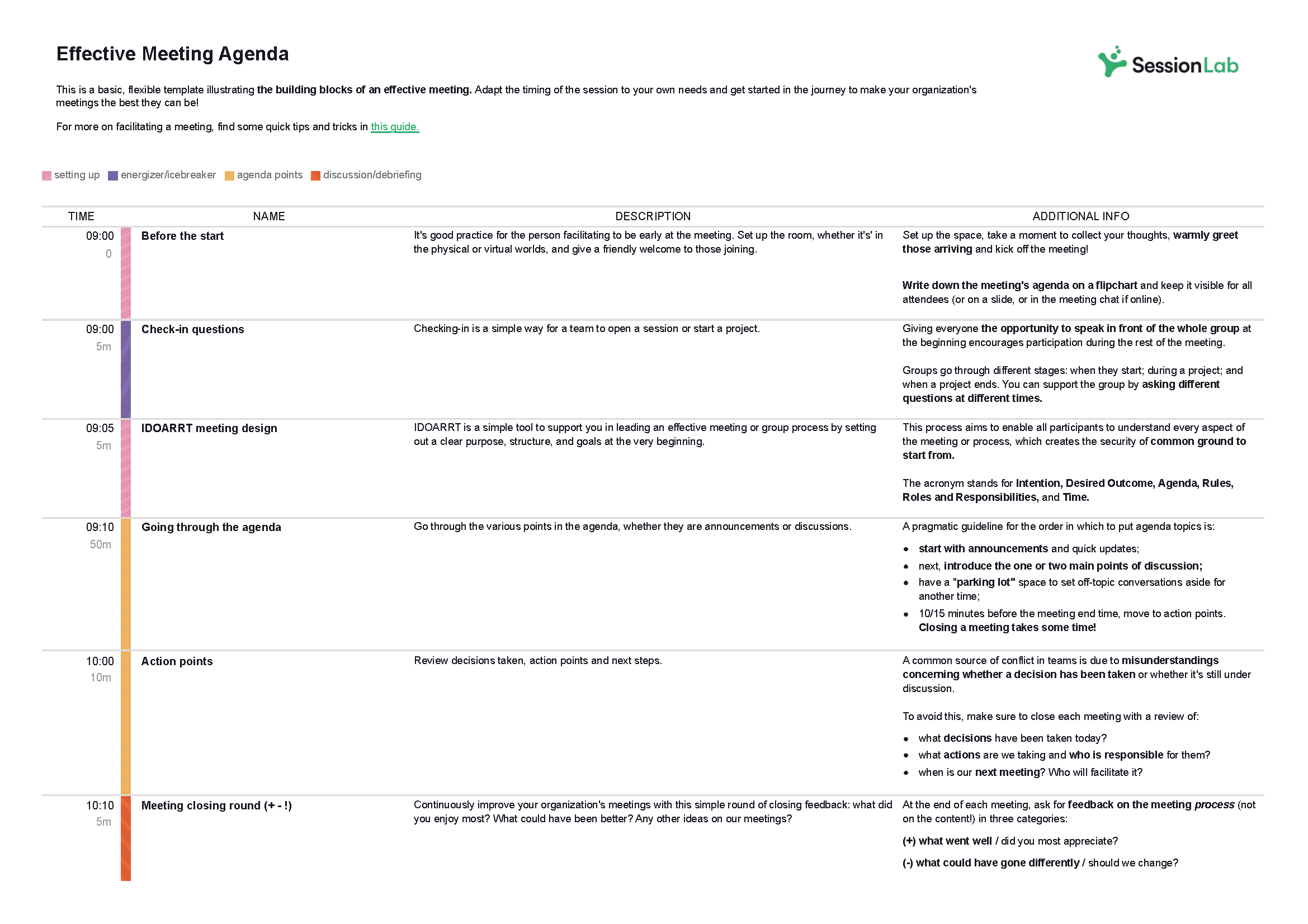
Great meetings tend to follow a clear structure. This effective meeting agenda is a proven structure for bringing a team together and pragmatically covering what is in your agenda.
This team meeting agenda template starts with a quick check-in to help your meeting participants get settled in. You then take a moment to share the intention, desired outcome, agenda, rules, roles and responsibilities, and time allocated for the meeting. By clearly outlining these items with IDOARRT, you can very quickly create the conditions for a productive meeting and get everyone on the same page.
When it comes to running your team meeting, use the following guidelines for choosing the order of your agenda items:
Agendas for a regular meeting or team gathering will differ depending on the group, setting, project and the time available. Use this team meeting agenda template as a solid skeleton for any such gathering and adjust to your needs!
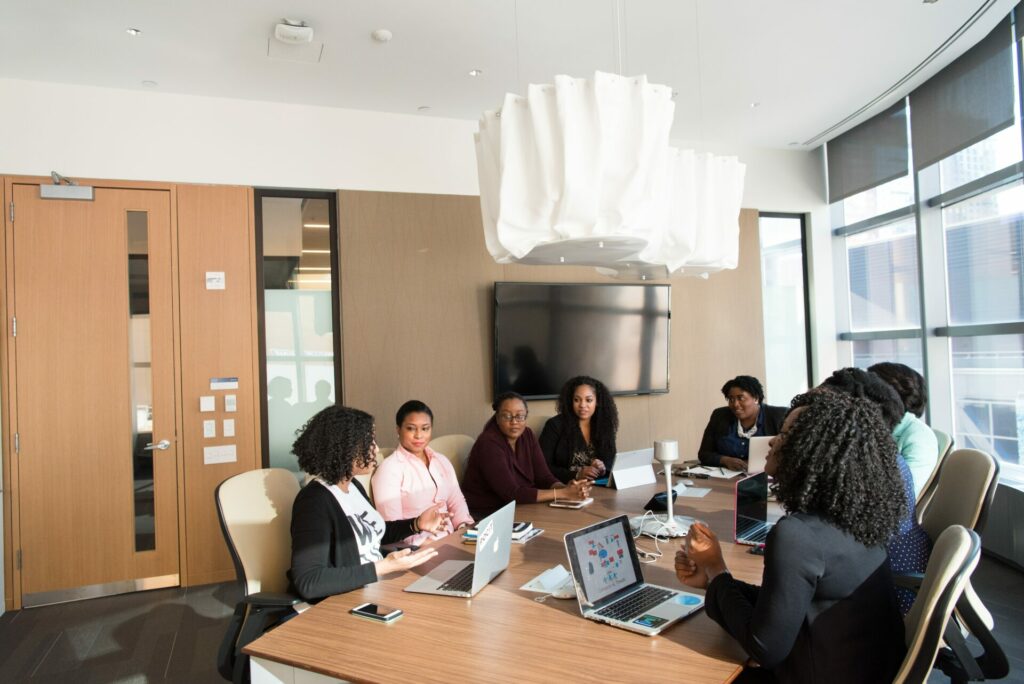
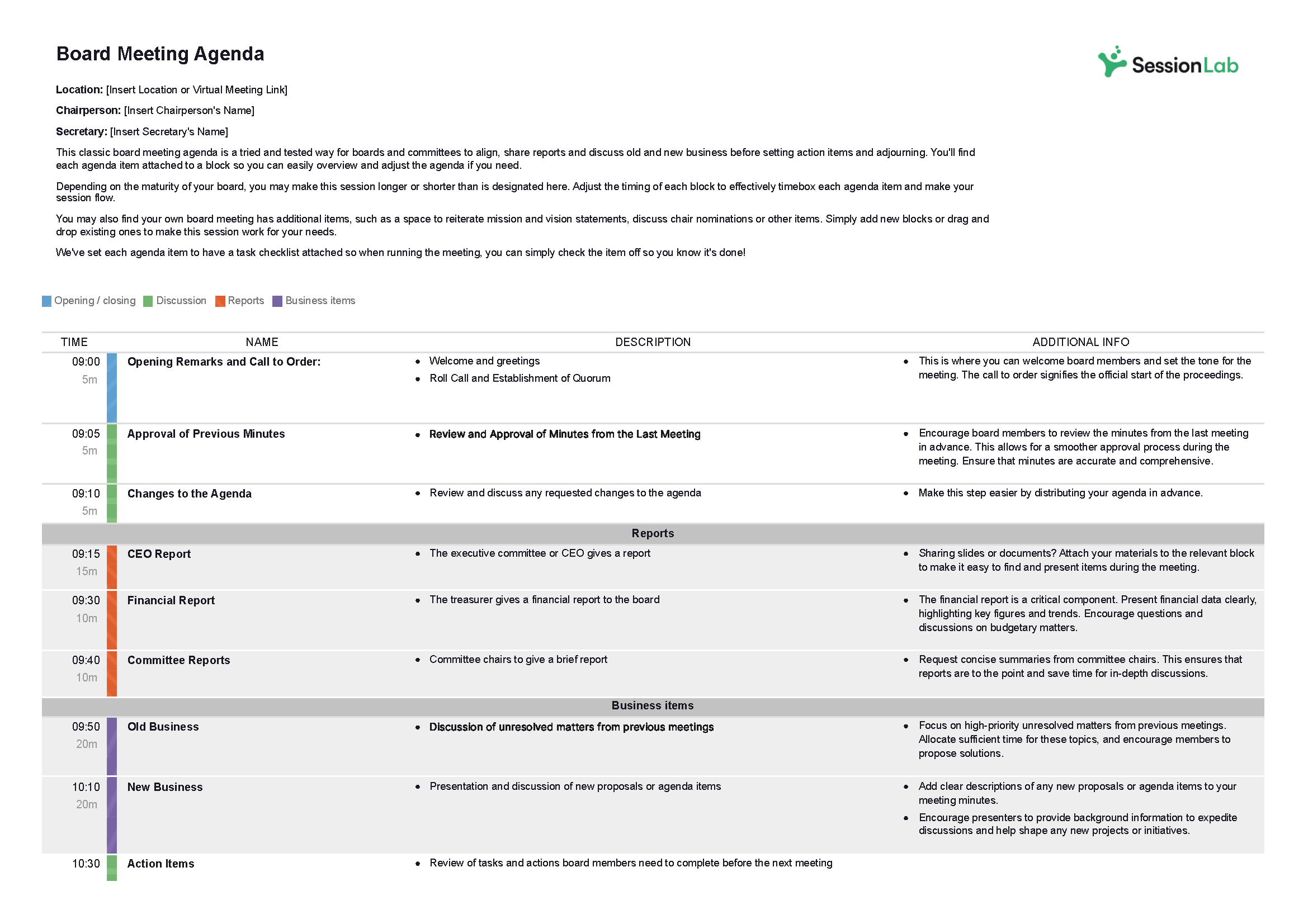
The classic agenda is a simple, time-tested board meeting format. Designed for boards and committees, this meeting format typically includes sections like “Call to Order,” “Approval of Minutes,” “Old Business,” “New Business,” “Discussion Items,” “Action Items,” and “Announcements.”
This meeting agenda template structure is suitable for formal meetings, such as board meetings and corporate gatherings, though it can easily be adapted to suit other needs.
This board meeting template runs for 2 hours, though depending on the maturity of your board, your meeting time may differ. Most board meetings can run for 3-4 hours, with a break somewhere in the middle.
In SessionLab, you can easily adjust the agenda and the overall timing will automatically calculate. Want to change the items in the agenda? Drag, drop and add new blocks to quickly tailor your agenda to the needs of your board. You’ll even find space to add meeting notes, meeting minutes and even attach reports or a presentation to each agenda item.
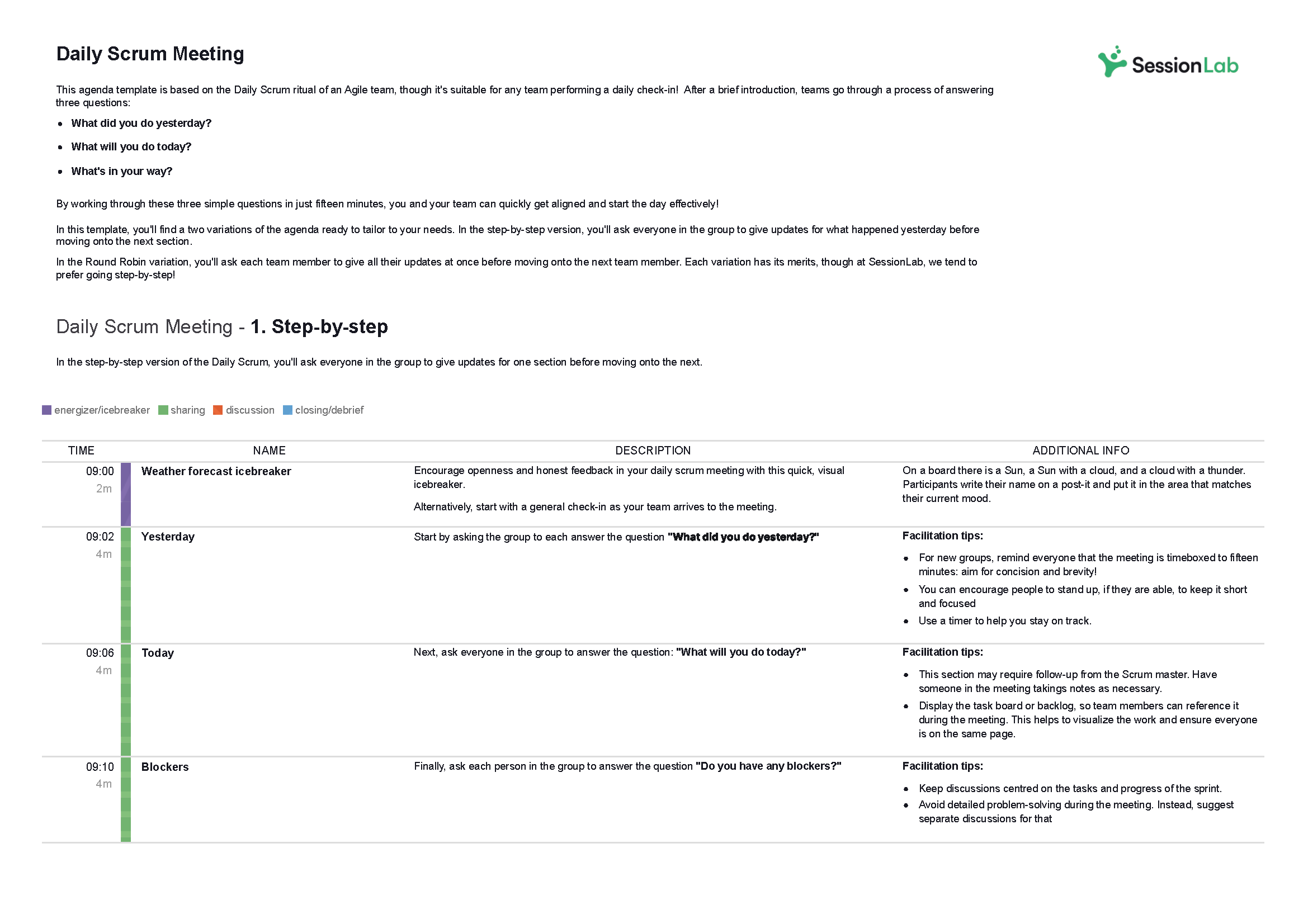
Stand-up meetings are all about brevity and focus. A typical stand-up meeting agenda might include sections for everyone on the team to check-in, share status updates, challenges and what they’ll be working on next.
This team meeting agenda template is based on the daily scrum of an Agile team, though it’s suitable for any team doing a daily check-in! After a brief introduction, teams go through a process of answering three questions:
By working through these three simple questions in just fifteen minutes, you and your team can quickly get aligned and start the day effectively! In this template, you’ll find a round-robin variation and a step-by-step version ready to tailor to your needs. Running weekly team meetings rather than one-a-day? This agenda template serves as a great foundation for a weekly alignment too.

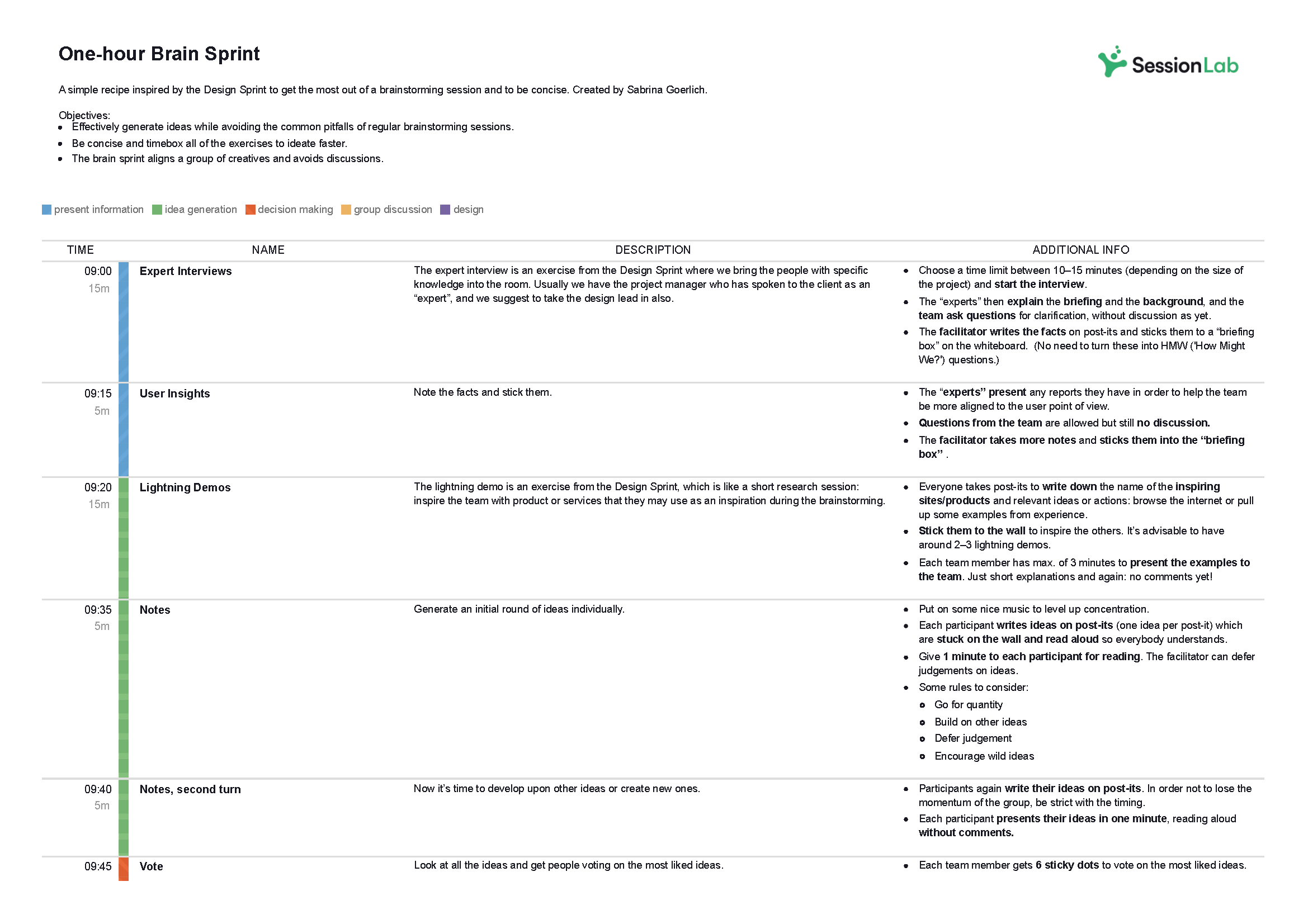
Brainstorming sessions are a great setting for unleashing a group’s collective intelligence and getting creative juices flowing. While this format encourages creativity and innovation, it doesn’t mean you don’t need structure. A good brainstorming session creates space for the unexpected though also helps your team stay focused, goal oriented and on-time.
In this team meeting agenda template created by Sabrina Goerlich, you and your team will spend just over an hour on a process based on Google’s design sprint, a proven structure for creating innovation and solving tough problems.
You’ll start by setting the stage with expert insights and a problem statement to help orient your team. Next, you’ll use a round of lightning demos to find inspiration before each team member individually brainstorms ideas and shares with group before a second round of ideation. After a round of voting for the best ideas, this brainstorming team meeting will be brought to a close by setting actions and assigning responsibilities.
The One Hour Brain Sprint is an effective meeting agenda template for any organization that wants to surface new ideas and solve tough problems. It’s especially effective if your problem does not have a clear solution, and you want to encourage creative input from everyone in your team.
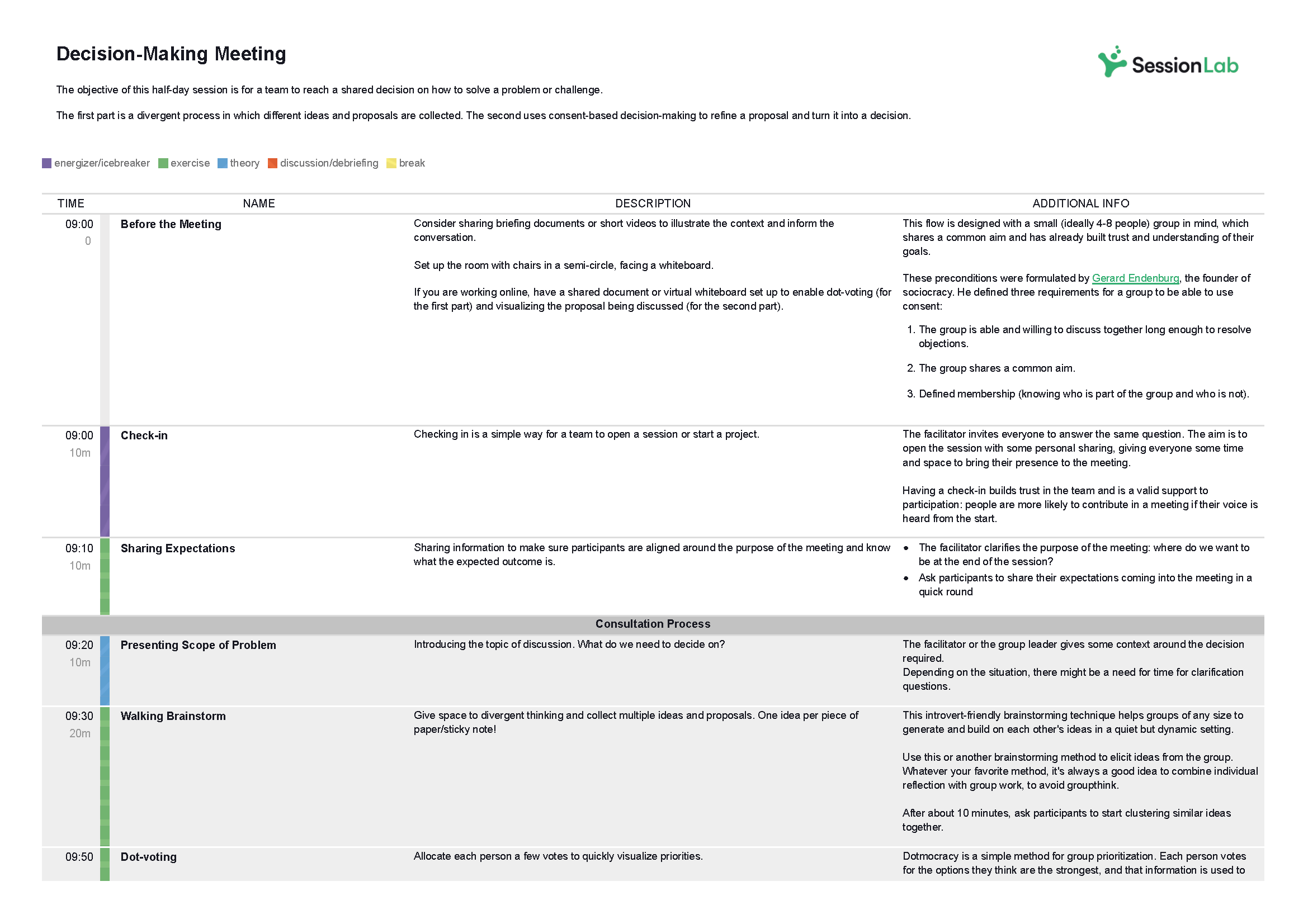
This decision making meeting agenda template is all about working together to make a decision and move forward as a team. It might be about a trying to solve a tough problem, working on innovative ideas or simply choosing the best solution from some you’ve already prepared.
This half-day team meeting agenda illustrates a complete flow from ideation to decision. You will find information and details on the following steps:
If you struggle with running team meetings where all attendees can feel involved while also ensuring the decisions made are high quality, this is the team meeting agenda you need.
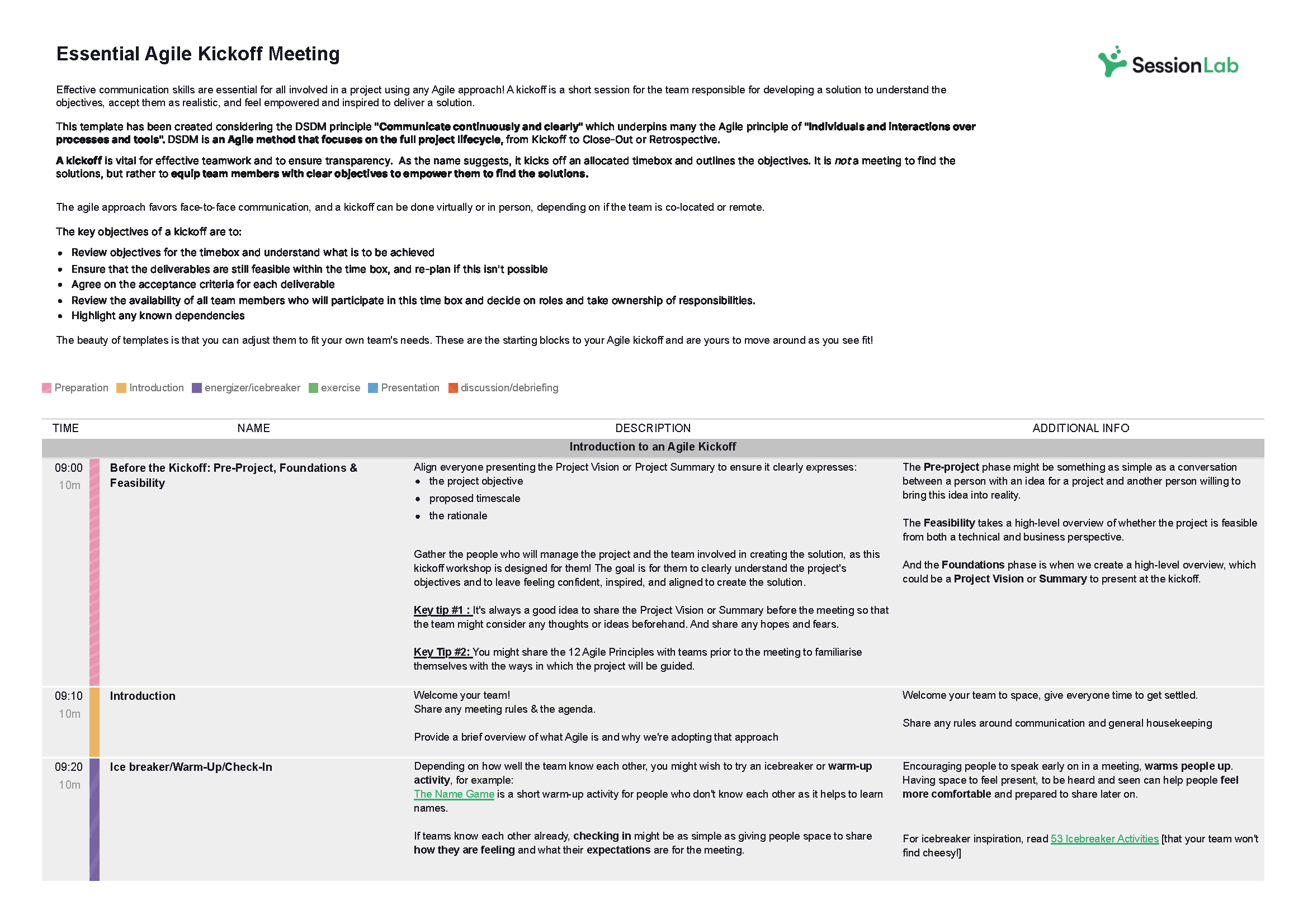
When starting a new project, running a kickoff will help your team get aligned and start on the right foot. If you’re working with an Agile methodology, this meeting agenda template is a proven process that adheres to Agile principles and gives a team everything they need to get started on their next sprint or project.
This template is designed to support teams new to Agile, as well as seasoned Agile organizations. Start with a refresher on Agile principles and agreements before moving into the kickoff proper. You’ll cover the project overview, set roles and responsibilities, set a timeline and define success criteria before closing with action items and a Q&A.
This team meeting agenda is one you’ll likely run with your Agile team again and again. Save time by reusing your session or making a template of your own. Include any variations or team rituals to ensure your team meeting is fit for purpose and successfully enables a smooth kickoff.
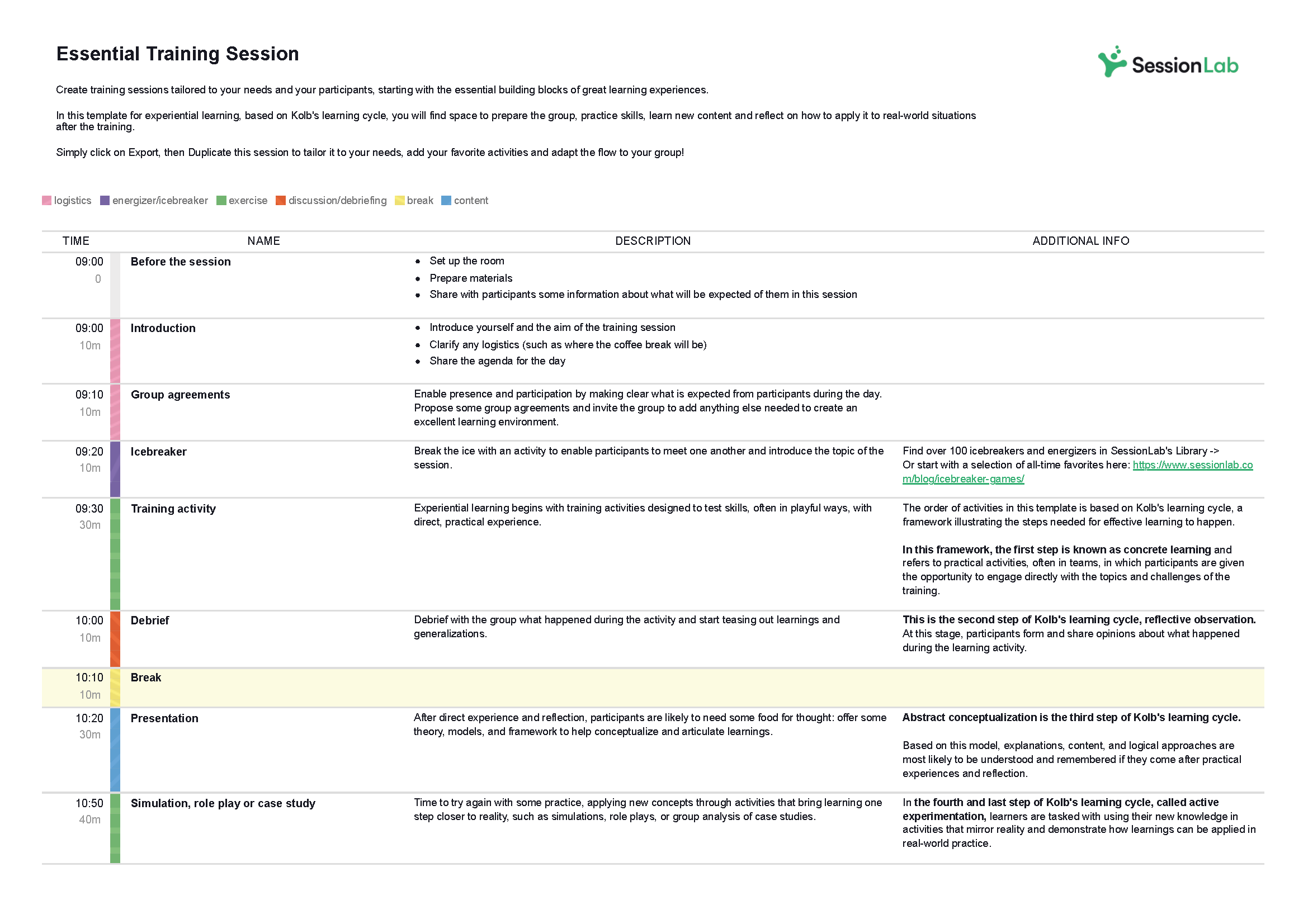
A clear and organized training sessions helps ensure participants get the most out of the experience. In this training session agenda template, you’ll use find an easy to amend structure for a basic training session. The agenda is based on a learning framework designed by American educational theorist David Kolb which follows four steps:
Before you dive into delivering your experiential training materials, you’ll have space for an opening section designed to orient participants. At the end of the session, you’ll also find time to collect learnings (a key step in ensuring training material sticks!) and effectively close your training session.
One common complaint of employee training is that the skills learned in a session rarely get applied after the trainer has left. This training agenda avoids this risk by including real-world examples, case studies, and giving participants time to reflect on what steps they will take, in practice, to apply what was presented at the training. Want to learn more? Explore our guide on how to design an engaging training session.
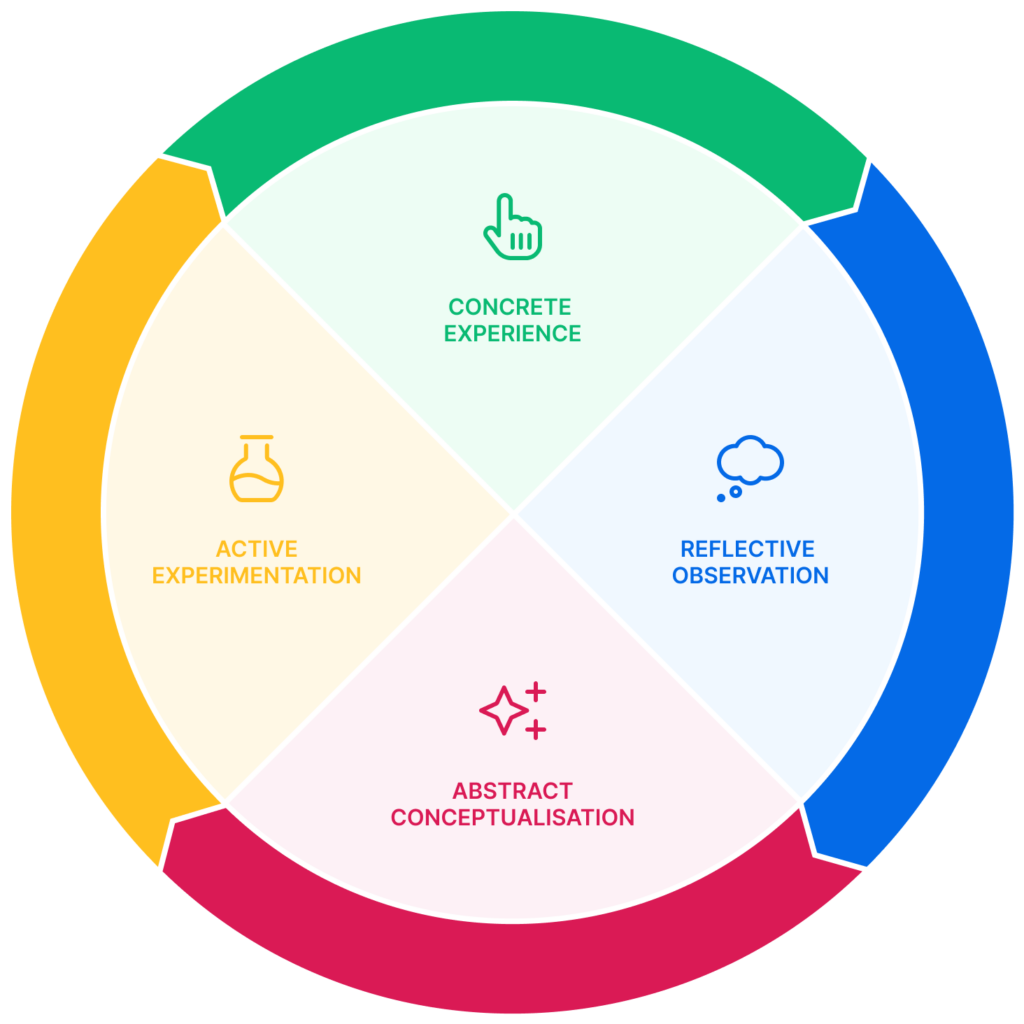
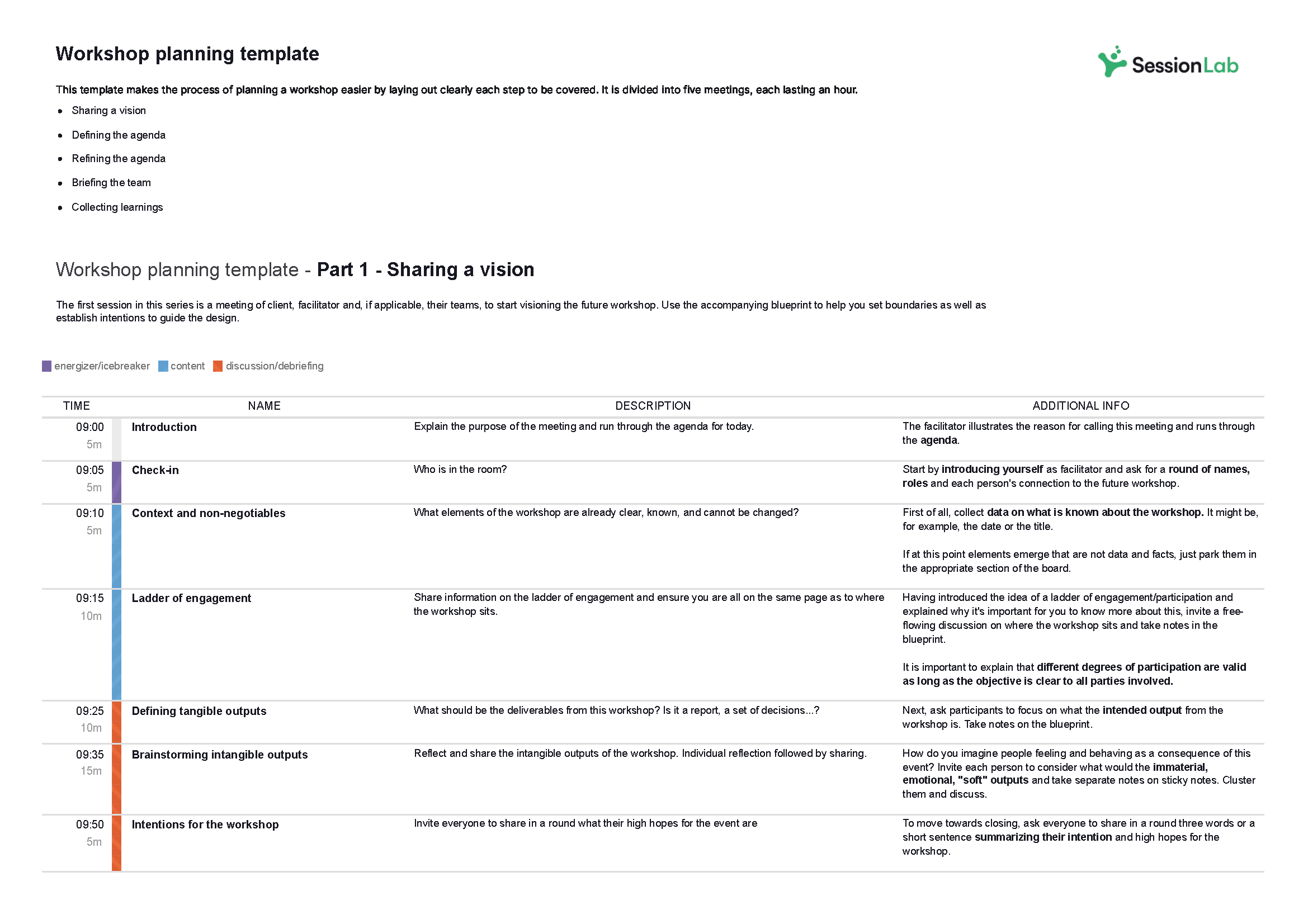
A great workshop doesn’t happen without adequate preparation. In this series of client meetings, we outline a process that allows you go from an idea to a completed workshop. Paired with our guide on how to plan a workshop, it’s a great resource for practically making a workshop or more carefully orchestrated team meeting happen.
This series of meeting agendas is divided into five parts, each lasting an hour.
The first part, Sharing a vision, is an agenda for the first meeting with your client (and/or their team) to set clear expectations, get on the same page and start shaping the future workshop. You can also download a ready-to-use canvas to help support this important first meeting!
The second part, Defining the agenda is the stage at which you will define your draft agenda using the information gathered in your previous meeting. For more information on agenda design, check out this post on how to design a workshop agenda!
The third part of this meeting agenda template, Refining the agenda, is about sharing your proposed agenda design and collecting feedback.
In the fourth section, you’ll get ready for the day of the workshop by briefing the team, host and speakers. Finally, after the event is over, get together once again for a retrospective meeting focused on learning.
![]()
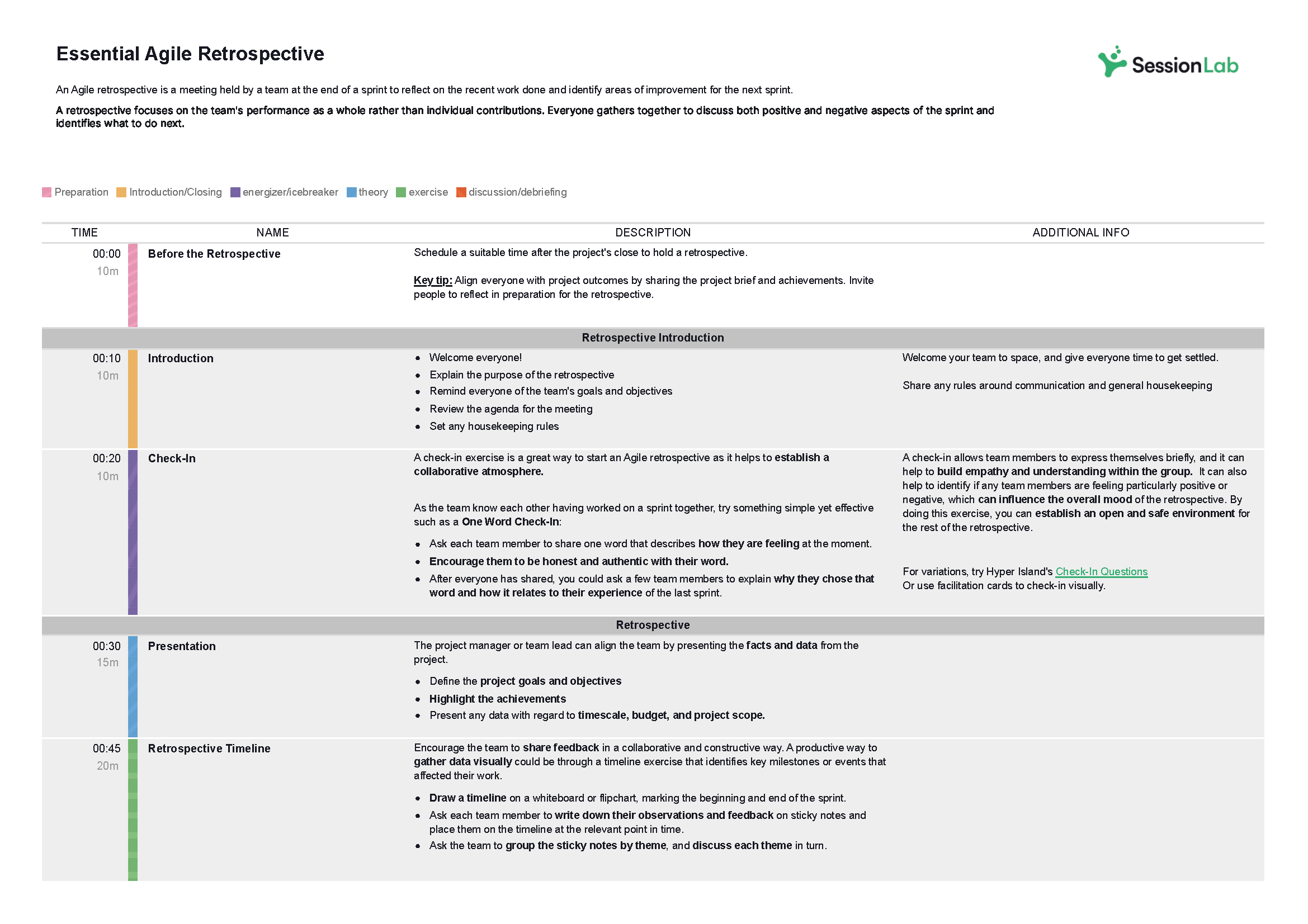
All projects and initiatives should be reflected upon and learned from. In this team meeting agenda template, you’ll take a group through an efficient project retrospective that will help you collect learnings, improve as a team and set clear next steps.
While this meeting agenda template is designed around the principles an Agile retrospective, it can be used for reflecting on any project or period of time, sprint or not!
Start by checking-in with the group and reiterating key facts and figures for your recently closed project. Next, lead the group through a process of reflecting on what happened at each stage of the project and recording feedback and insights.
After generating insights and identifying the root causes of things that went well and could be improved you’ll collaboratively decide what to do next time. Record takeaways and learnings and then close with a round of feedback and a final debrief.
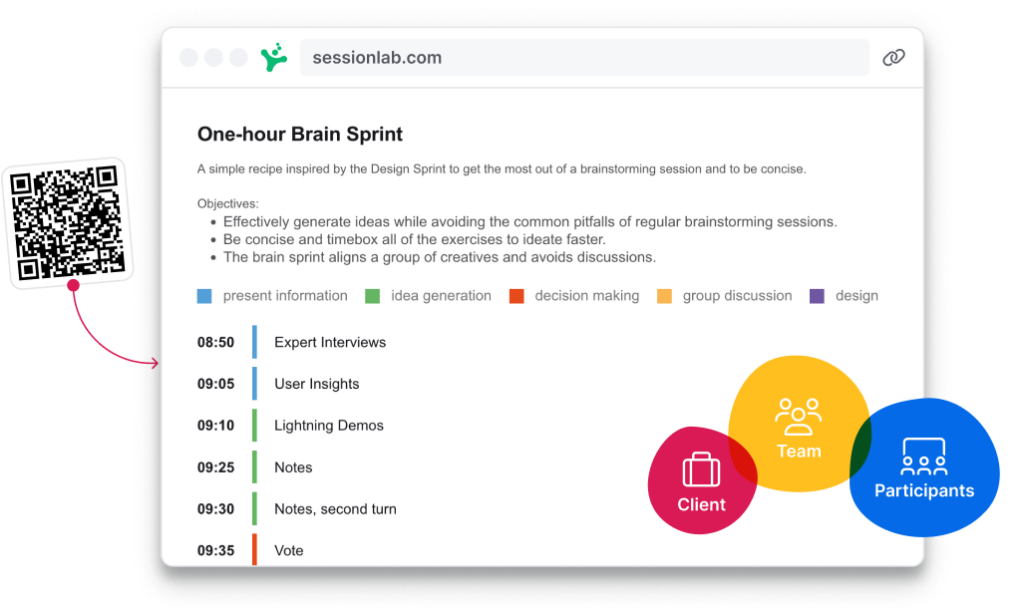
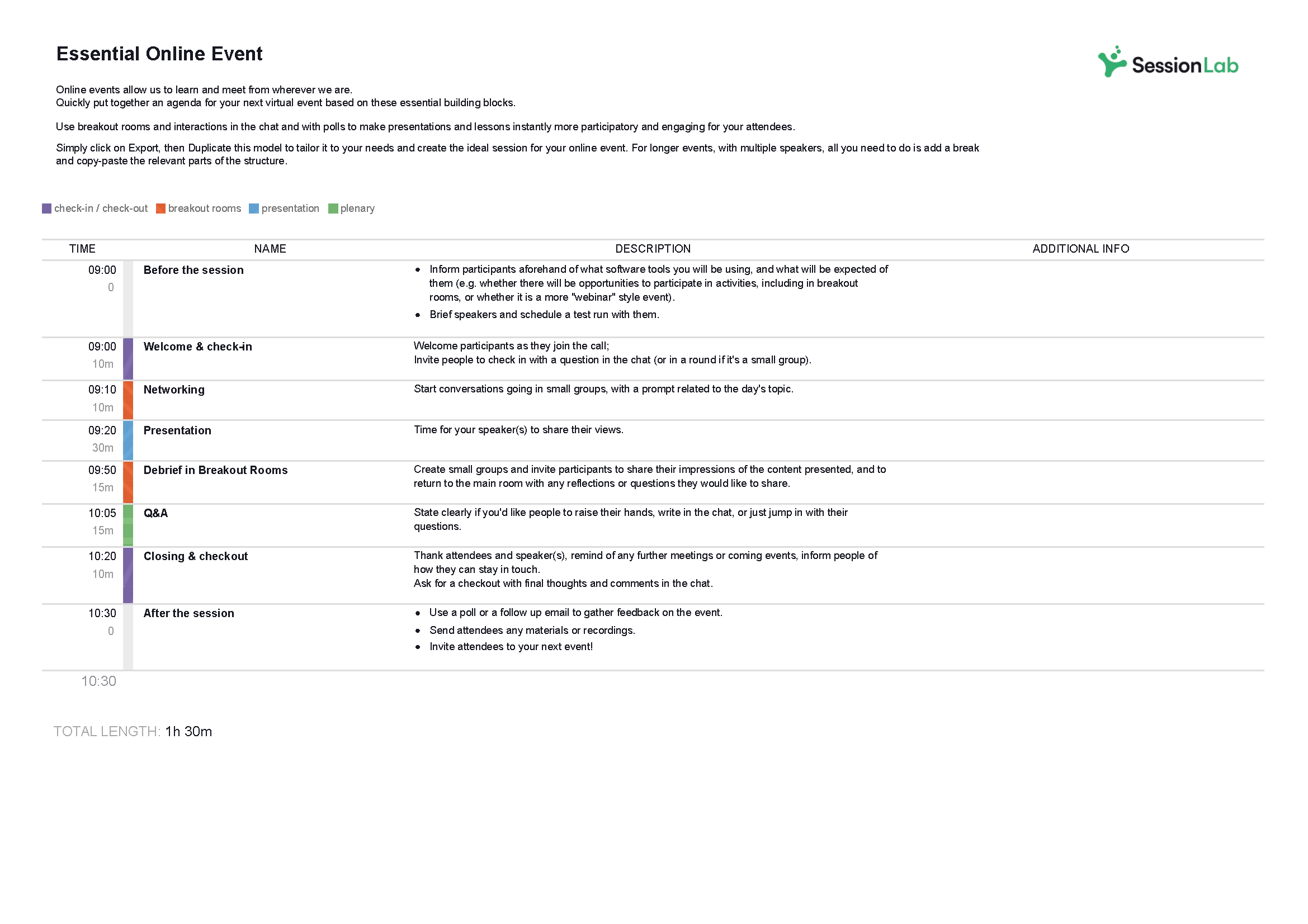
Whether you’re running a formal meeting with a virtual audience or creating an informal networking session, an agenda helps you stay organized. This simple meeting agenda template is designed for anyone running an online session. It has space for presenters or speakers to share content, as well as blocks for general networking and breakout groups.
This agenda template begins with space to welcome attendees and introduce a guest speaker before moving into networking and a featured presentation. Add breakout rooms to the agenda in SessionLab to easily organize parallel discussions and tailor this session to your group.
A well crafted meeting agenda is an essential element of a successful meeting. Paired with effective meeting facilitation, using a team meeting agenda template can help you and your group achieve your goals and finish on time too! Whatever your purpose, we hope the agenda templates above serve as a useful starting point.
Remember that a structured meeting agenda template not only keeps the meeting on track but also sets the tone for a productive and meaningful gathering. Adapt and customize these agenda templates to suit your needs, attach the agenda to your calendar invites and refer to the agenda throughout your session to start hosting more efficient and engaging meetings.
Want to see more? You can explore our complete template collection to find inspiration or a proven process for your next workshop, meeting or training session.
Ready to start designing your own meeting template? Explore how SessionLab can help save you time and effort when designing your next agenda.
James Smart Head of ContentJames Smart is Head of Content at SessionLab. He’s also a creative facilitator who has run workshops and designed courses for establishments like the National Centre for Writing, UK. He especially enjoys working with young people and empowering others in their creative practice.